【BBC六分钟英语】正念提供的好处是什么?

【英文脚本】
Neil
OK, I want you to close your eyes. Focus… on your breathing.
Catherine
Er, Neil? Can we do this later? We’ve only got six minutes.
Neil
Ok, Catherine. Welcome to a mindful edition of 6 Minute English, where we’re exploring the rise of mindfulness – particularly in schools.
Catherine
And we’ll be teaching six items of vocabulary along the way. So I think we should start with mindfulness itself.
Neil
Being mindful, as an adjective, means ‘being calmly aware of everything in your body and mind’. You only focus on ‘now’.
Catherine
People practise mindfulness, the noun, by focusing only on their breath, and not allowing themselves to be distracted by passing thoughts.
Neil
Indeed. It’s traditionally associated with Buddhism, and has become incredibly popular in the secular world – in workplaces, in private classes and even in schools.
Catherine
Secular means ‘non-religious’ by the way.
Neil
OK, I just mentioned schools: how many teachers in the UK are trained to teach mindfulness? Is it… a) 500, b) 5,000 or c) 50,000?
Catherine
Let me focus really hard – I think it’s 5,000.
Neil
A very mindful answer, Catherine. But I’ll reveal the real answer later. Now let’s hear from one teacher who’s been practising mindfulness with students for many years. Alison Mayo, Head of Early Years at Dharma Primary School, thinks it’s particularly suited to young children. Why?
Alison Mayo, Head of Early Years, Dharma Primary School
That’s very natural for children - to be in the present. And we really kind of celebrate that because that is a place where they are learning. So, if they feel grounded, then they can really develop their concentration and their focus, and relax. Learning happens so much more easily if you’re relaxed and happy.
Neil
Alison said it was natural for children to be in the present.
Catherine
The present – means ‘now’. You’ll know it from the ‘present tense’ in grammar. And people who practise mindfulness use this phrase a lot – to be in the present, or in the present moment.
Neil
It sounds simple, but actually it’s very hard to achieve.
Catherine
Well, Neil, it might be for an old chap like you, but for young people, Miss Mayo thinks it’s very natural.
Neil
Fair enough. Being grounded, as she says, helps students concentrate and learn in a relaxed way.
Catherine
Grounded is another good adjective there – it means ‘rational, sensible, clear thinking’.
Neil
So, she’s a fan of mindfulness. And there’s growing evidence behind its benefits.
Catherine
Yes. The UK’s national health advisory body has recommended it to help treat conditions like depression and anxiety.
Neil
Studies have shown it reduces levels of the stress hormone, cortisol.
Catherine
And a new study has claimed that eating mindfully can actually help people to lose weight.
Neil
You mean eating slowly?
Catherine
Yeah, slowly and really experiencing and tasting the food. Not being distracted and not eating too much too fast! Anyway, Neil, is mindfulness taking over the world?
Neil
Well, not quite yet. There still aren’t many detailed studies on it – and some critics say the studies we have show a publication bias. In other words, only the positive results are published.
Catherine
A bias is when you support something or someone in an unfair way, because of your preferences or beliefs.
Neil
What seems certain is that mindfulness has entered into many aspects of modern life, at least here in the UK. Now, let’s look back at our question. I asked how many teachers in the UK have been trained in mindfulness.
Catherine
And I said 5,000.
Neil
Well, it was actually 5,000. Well done! According to the Mindfulness Initiative. And it keeps on growing.
Catherine
So before we finish up, here’s another question that might be useful for our listeners – what’s the difference between mindfulness and meditation?
Neil
Aha – that’s not so easy to define. Meditation is the broader term. When you meditate you spend time quietly – focusing your mind - often for relaxation or spiritual purposes. Mindfulness is a particular a kind of meditation – when you try to empty your mind of thought. Does that make sense?
Catherine
Yeah, more or less. So we’ll let our listeners meditate on that answer. And before we empty our minds, let’s look back at today’s words. We had mindfulness, mindful and mindfully – they all relate to the particular practice of being only focused of what’s happening now.
Neil
What’s happening now, or we could say – what’s happening in the present. People often focus on the past – thinking back about mistakes or happy memories…
Catherine
Or on the future – which can be full of worries. But by being in the present – you overcome these thoughts and fears. Next, we have secular. It contrasts with ‘religious’. So, while a church is a religious building, we also have secular buildings – like factories and shops and hospitals…
Neil
All non-religious buildings, in other words!
Catherine
Exactly. Now, tell me Neil, are you feeling grounded right now?
Neil
You’re asking if I’m thinking clearly and feeling connected to the world? Do you even have to ask, Catherine – I’m a very grounded person.
Catherine
You are, most of the time. Most of the time you’re naturally grounded, every now and again you get a bit panicked, but … some of us need to remember to slow down, chill out and meditate once in a while.
Neil
Yes, that would be meditate meaning to take quiet time to focus deeply on something.
Catherine
Exactly. Now for more ways to improve your English I suggest you mindfully visit our Facebook, Twitter, Instagram and YouTube pages.
Neil
Yes, focus only on our pages. Don’t be distracted by anything else!
Both
Bye!
【中英文双语脚本】
Neil(尼尔)
OK, I want you to close your eyes. Focus… on your breathing.
好,我要你闭上眼睛。重点。。。在你的呼吸上。
Catherine(凯瑟琳)
Er, Neil? Can we do this later? We’ve only got six minutes.
呃,尼尔?我们可以稍后再做吗?我们只有六分钟的时间。
Neil(尼尔)
Ok, Catherine. Welcome to a mindful edition of 6 Minute English, where we’re exploring the rise of mindfulness – particularly in schools.
好的,凯瑟琳。欢迎来到六分钟英语的正念版,我们正在探索正念的兴起 —— 尤其是在学校。
Catherine(凯瑟琳)
And we’ll be teaching six items of vocabulary along the way. So I think we should start with mindfulness itself.
在此过程中,我们将教授 6 个词汇项目。所以我认为我们应该从正念本身开始。
Neil(尼尔)
Being mindful, as an adjective, means ‘being calmly aware of everything in your body and mind’. You only focus on ‘now’.
正念,作为一个形容词,意思是 “冷静地意识到你身体和心灵的一切”。你只关注 ‘现在’ 。
Catherine(凯瑟琳)
People practise mindfulness, the noun, by focusing only on their breath, and not allowing themselves to be distracted by passing thoughts.
人们练习正念,这个名词,只关注他们的呼吸,不允许自己被转瞬即逝的想法分心。
Neil(尼尔)
Indeed. It’s traditionally associated with Buddhism, and has become incredibly popular in the secular world – in workplaces, in private classes and even in schools.
事实上。它传统上与佛教联系在一起,并在世俗世界中变得非常流行 —— 在工作场所、私人课堂甚至学校。
Catherine(凯瑟琳)
Secular means ‘non-religious’ by the way.
顺便说一句,世俗的意思是“非宗教的”。
Neil(尼尔)
OK, I just mentioned schools: how many teachers in the UK are trained to teach mindfulness? Is it… a) 500, b) 5,000 or c) 50,000?
好的,我刚才提到了学校:英国有多少教师接受过教授正念的培训?是吗。。。a) 500,b) 5,000 还是 c) 50,000?
Catherine(凯瑟琳)
Let me focus really hard – I think it’s 5,000.
让我非常专注 – 我想是 5,000 次。
Neil(尼尔)
A very mindful answer, Catherine. But I’ll reveal the real answer later. Now let’s hear from one teacher who’s been practising mindfulness with students for many years. Alison Mayo, Head of Early Years at Dharma Primary School, thinks it’s particularly suited to young children. Why?
一个非常用心的回答,凯瑟琳。但我稍后会透露真正的答案。现在让我们听听一位多年来一直与学生一起练习正念的老师的故事。Dharma 小学幼儿园校长 Alison Mayo 认为它特别适合幼儿。为什么?
Alison Mayo, Head of Early Years, Dharma Primary School(AlisonMayo,Dharma小学幼儿园校长)
That’s very natural for children - to be in the present. And we really kind of celebrate that because that is a place where they are learning. So, if they feel grounded, then they can really develop their concentration and their focus, and relax. Learning happens so much more easily if you’re relaxed and happy.
这对孩子们来说是很自然的 - 活在当下。我们真的很庆祝这一点,因为那是他们学习的地方。所以,如果他们感到脚踏实地,那么他们就可以真正发展自己的专注力和专注力,并放松下来。如果你放松和快乐,学习就会更容易发生。
Neil(尼尔)
Alison said it was natural for children to be in the present.
艾莉森说,孩子们活在当下是很自然的。
Catherine(凯瑟琳)
The present – means ‘now’. You’ll know it from the ‘present tense’ in grammar. And people who practise mindfulness use this phrase a lot – to be in the present, or in the present moment.
现在 – 意思是“现在”。你会从语法中的 “现在时” 中知道它。练习正念的人经常使用这个词 —— 活在当下,或者活在当下。
Neil(尼尔)
It sounds simple, but actually it’s very hard to achieve.
这听起来很简单,但实际上很难实现。
Catherine(凯瑟琳)
Well, Neil, it might be for an old chap like you, but for young people, Miss Mayo thinks it’s very natural.
嗯,尼尔,对于像你这样的老家伙来说,这可能是很自然的,但对于年轻人来说,梅奥小姐认为这是很自然的。
Neil(尼尔)
Fair enough. Being grounded, as she says, helps students concentrate and learn in a relaxed way.
很公平。正如她所说,脚踏实地有助于学生集中注意力并以轻松的方式学习。
Catherine(凯瑟琳)
Grounded is another good adjective there – it means ‘rational, sensible, clear thinking’.
Grounded 是另一个很好的形容词 —— 它的意思是“理性、明智、清晰的思考”。
Neil(尼尔)
So, she’s a fan of mindfulness. And there’s growing evidence behind its benefits.
所以,她是正念的粉丝。越来越多的证据表明它的好处。
Catherine(凯瑟琳)
Yes. The UK’s national health advisory body has recommended it to help treat conditions like depression and anxiety.
是的。英国国家健康咨询机构建议它帮助治疗抑郁症和焦虑症等疾病。
Neil(尼尔)
Studies have shown it reduces levels of the stress hormone, cortisol.
研究表明,它可以降低压力荷尔蒙皮质醇的水平。
Catherine(凯瑟琳)
And a new study has claimed that eating mindfully can actually help people to lose weight.
一项新的研究声称,正念饮食实际上可以帮助人们减肥。
Neil(尼尔)
You mean eating slowly?
你是说慢慢吃?
Catherine(凯瑟琳)
Yeah, slowly and really experiencing and tasting the food. Not being distracted and not eating too much too fast! Anyway, Neil, is mindfulness taking over the world?
是的,慢慢地真正体验和品尝食物。不要分心,也不会吃得太多太快!不管怎样,尼尔,正念正在接管世界吗?
Neil(尼尔)
Well, not quite yet. There still aren’t many detailed studies on it – and some critics say the studies we have show a publication bias. In other words, only the positive results are published.
嗯,现在还不完全是。关于它的详细研究仍然不多 —— 一些批评者说,我们的研究显示出出版偏倚。换句话说,只发布积极的结果。
Catherine(凯瑟琳)
A bias is when you support something or someone in an unfair way, because of your preferences or beliefs.
偏见是指您因为自己的偏好或信仰而以不公平的方式支持某事或某人。
Neil(尼尔)
What seems certain is that mindfulness has entered into many aspects of modern life, at least here in the UK. Now, let’s look back at our question. I asked how many teachers in the UK have been trained in mindfulness.
似乎可以肯定的是,正念已经进入了现代生活的许多方面,至少在英国是这样。现在,让我们回顾一下我们的问题。我问英国有多少老师接受过正念培训。
Catherine(凯瑟琳)
And I said 5,000.
我说 5,000 人。
Neil(尼尔)
Well, it was actually 5,000. Well done! According to the Mindfulness Initiative. And it keeps on growing.
嗯,实际上是 5,000 人。干的好!根据正念倡议。而且它一直在增长。
Catherine(凯瑟琳)
So before we finish up, here’s another question that might be useful for our listeners – what’s the difference between mindfulness and meditation?
因此,在我们结束之前,这里有另一个可能对我们的听众有用的问题 —— 正念和冥想有什么区别?
Neil(尼尔)
Aha – that’s not so easy to define. Meditation is the broader term. When you meditate you spend time quietly – focusing your mind - often for relaxation or spiritual purposes. Mindfulness is a particular a kind of meditation – when you try to empty your mind of thought. Does that make sense?
啊哈 – 这不太容易定义。冥想是一个更广泛的术语。当你冥想时,你会安静地花时间 - 集中你的注意力 - 通常用于放松或精神目的。正念是一种特殊的冥想 – 当你试图清空你的思想时。这有意义吗?
Catherine(凯瑟琳)
Yeah, more or less. So we’ll let our listeners meditate on that answer. And before we empty our minds, let’s look back at today’s words. We had mindfulness, mindful and mindfully – they all relate to the particular practice of being only focused of what’s happening now.
是的,或多或少。因此,我们要让我们的听众默想这个答案。在我们清空头脑之前,让我们回顾一下今天的话语。我们有正念、正念和正念 —— 它们都与只关注现在发生的事情的特殊练习有关。
Neil(尼尔)
What’s happening now, or we could say – what’s happening in the present. People often focus on the past – thinking back about mistakes or happy memories…
现在发生了什么,或者我们可以说 – 现在发生了什么。人们经常关注过去 – 回想错误或快乐的回忆……
Catherine(凯瑟琳)
Or on the future – which can be full of worries. But by being in the present – you overcome these thoughts and fears. Next, we have secular. It contrasts with ‘religious’. So, while a church is a religious building, we also have secular buildings – like factories and shops and hospitals…
或者关于未来 - 这可能充满担忧。但是,通过活在当下 – 你会克服这些想法和恐惧。接下来,我们有世俗的。它与 “religious” 形成对比。所以,虽然教堂是宗教建筑,但我们也有世俗建筑 – 比如工厂、商店和医院……
Neil(尼尔)
All non-religious buildings, in other words!
换句话说,都是非宗教建筑!
Catherine(凯瑟琳)
Exactly. Now, tell me Neil, are you feeling grounded right now?
完全。现在,告诉我 Neil,你现在感觉脚踏实地了吗?
Neil(尼尔)
You’re asking if I’m thinking clearly and feeling connected to the world? Do you even have to ask, Catherine – I’m a very grounded person.
你是在问我是否思考清晰,感觉与世界有联系吗?你甚至需要问吗,Catherine – 我是一个非常脚踏实地的人。
Catherine(凯瑟琳)
You are, most of the time. Most of the time you’re naturally grounded, every now and again you get a bit panicked, but … some of us need to remember to slow down, chill out and meditate once in a while.
大多数时候,你都是。大多数时候你天生就被禁足了,时不时地你会有点恐慌,但是……我们中的一些人需要记住放慢脚步,放松一下,偶尔冥想一下。
Neil(尼尔)
Yes, that would be meditate meaning to take quiet time to focus deeply on something.
是的,那将是冥想的意思,花点时间安静地专注于某件事。
Catherine(凯瑟琳)
Exactly. Now for more ways to improve your English I suggest you mindfully visit our Facebook, Twitter, Instagram and YouTube pages.
完全。现在,要了解更多提高英语水平的方法,我建议您认真访问我们的 Facebook、Twitter、Instagram 和 YouTube 页面。
Neil(尼尔)
Yes, focus only on our pages. Don’t be distracted by anything else!
是的,只关注我们的页面。不要被其他任何事情分心!
Both(双)
Bye!
再见!

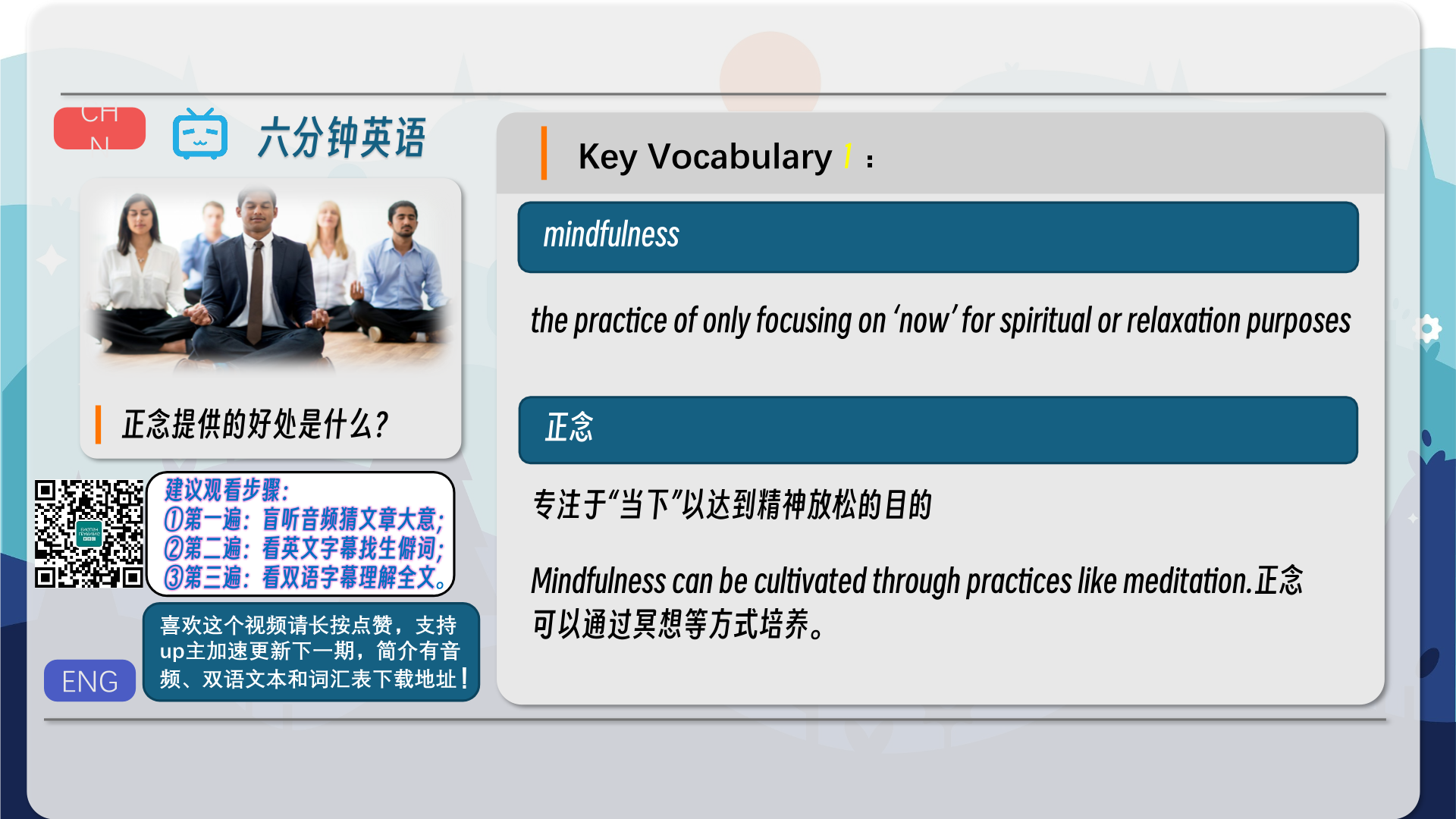
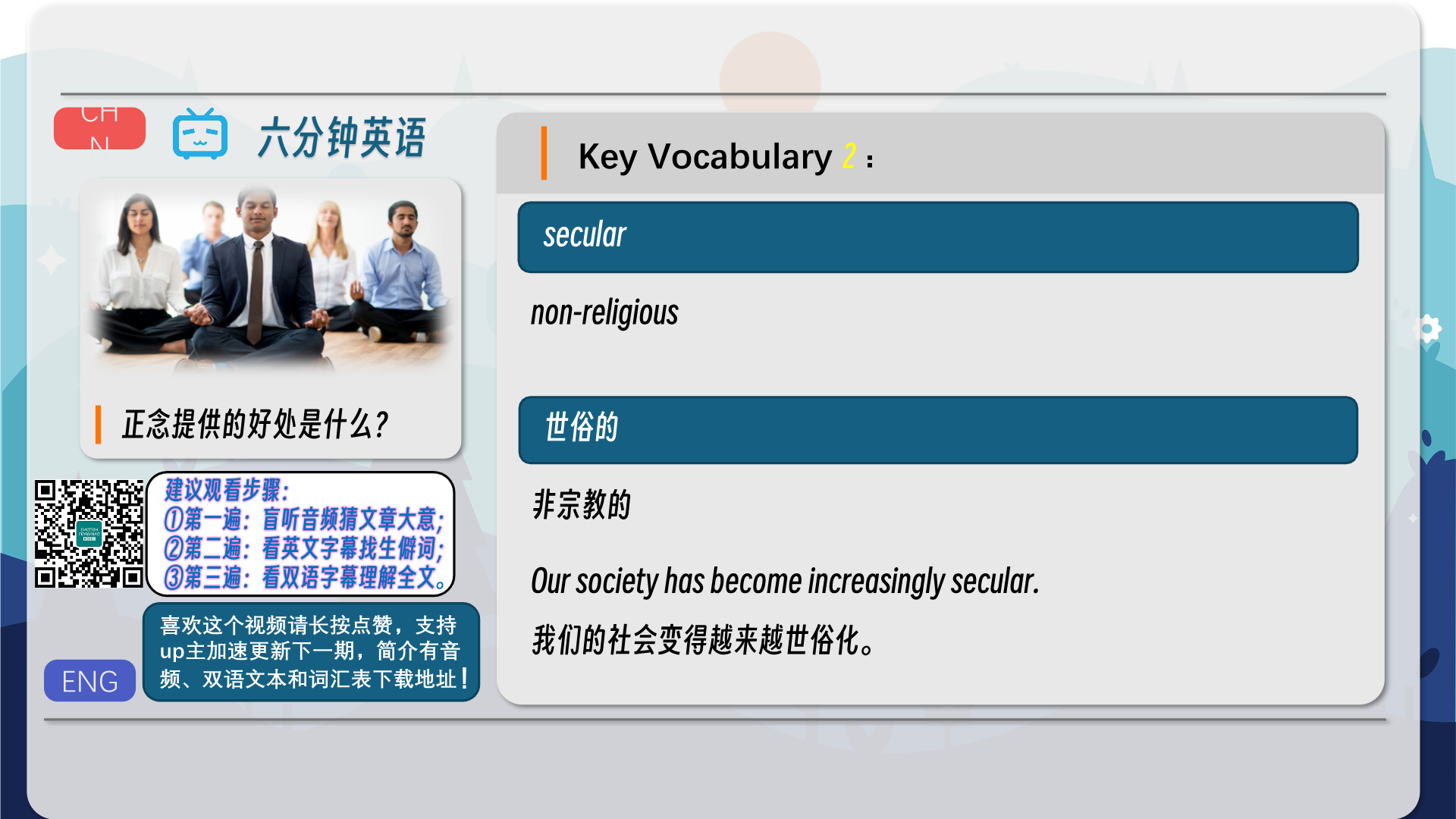
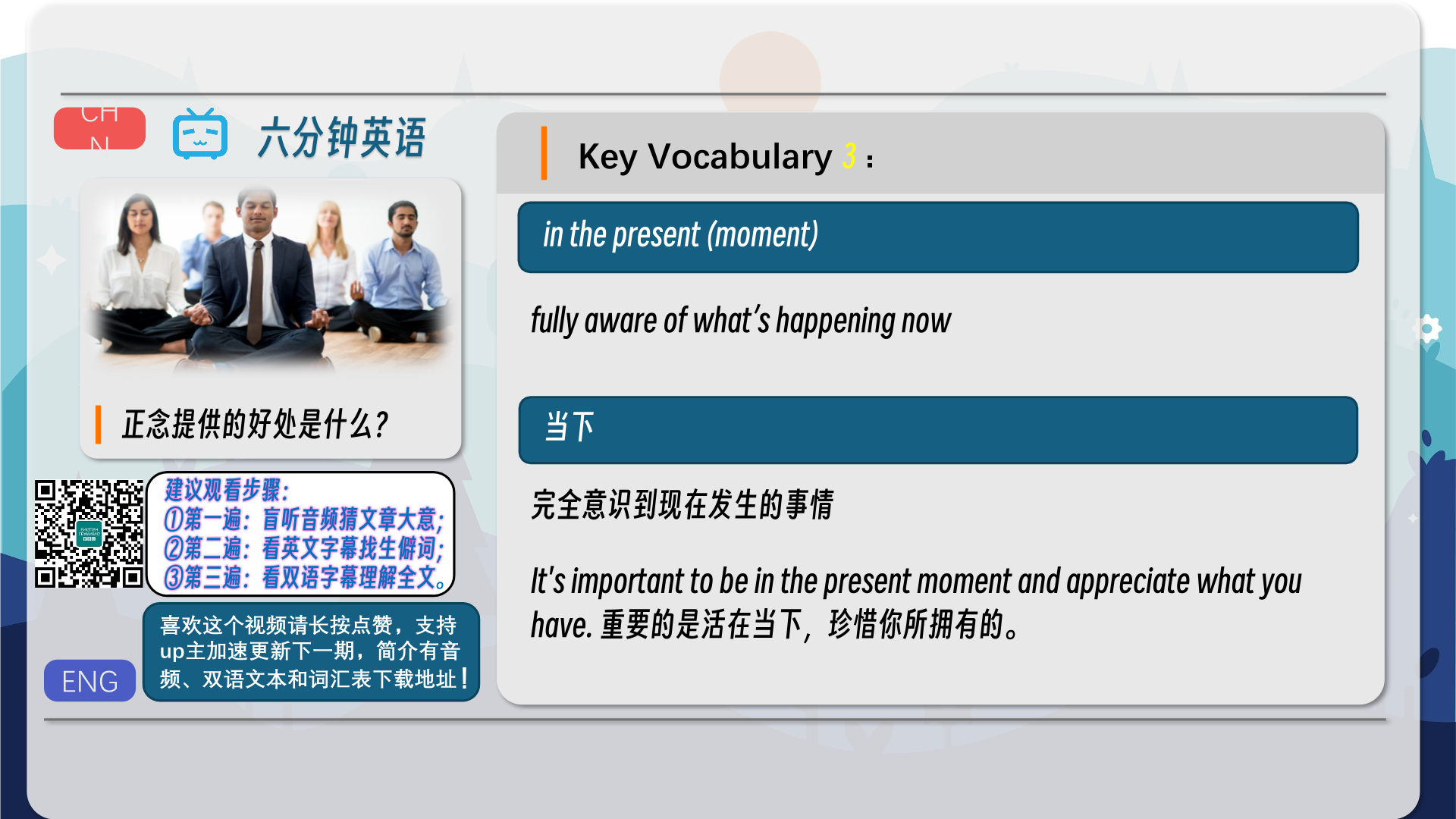
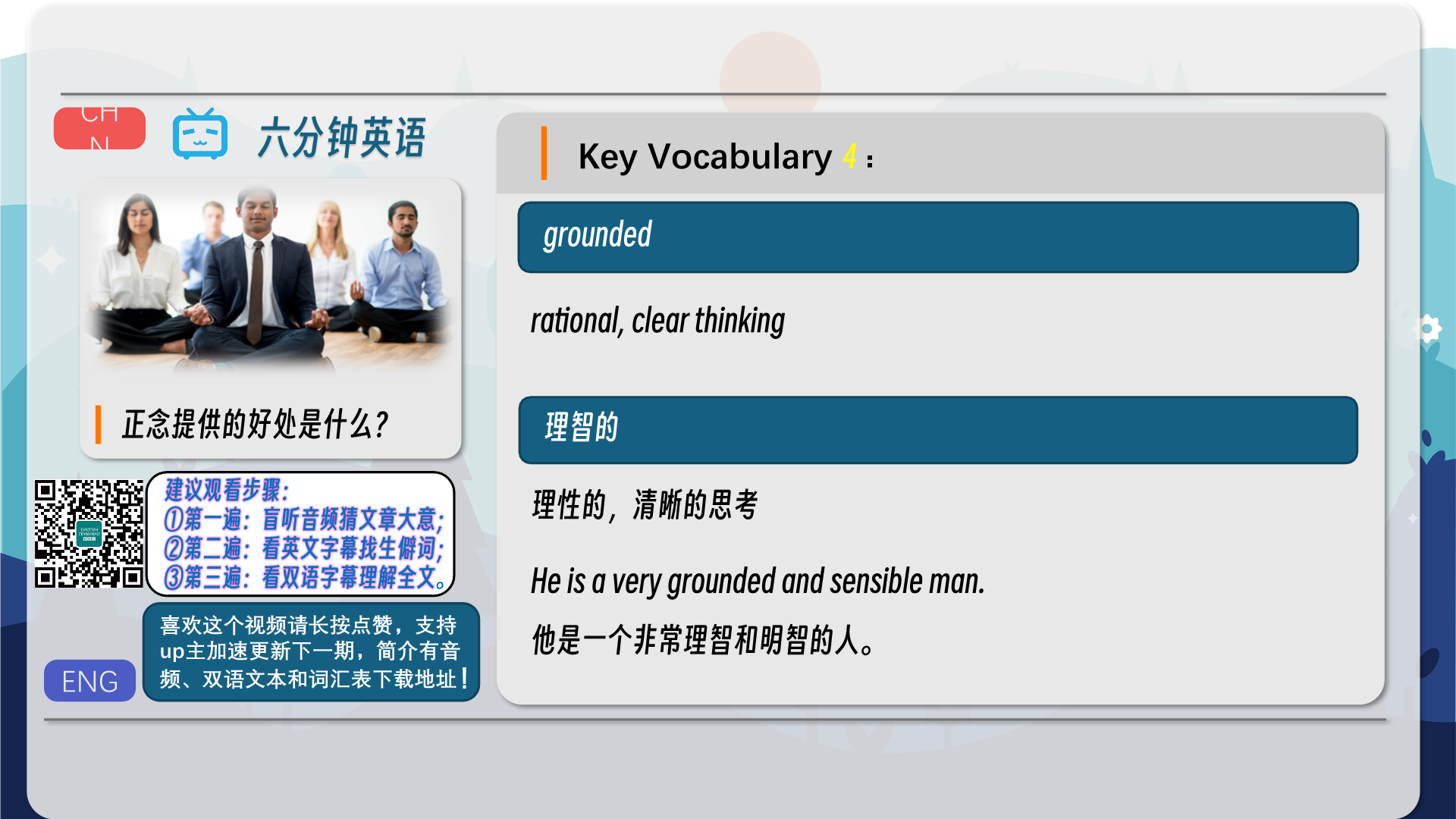
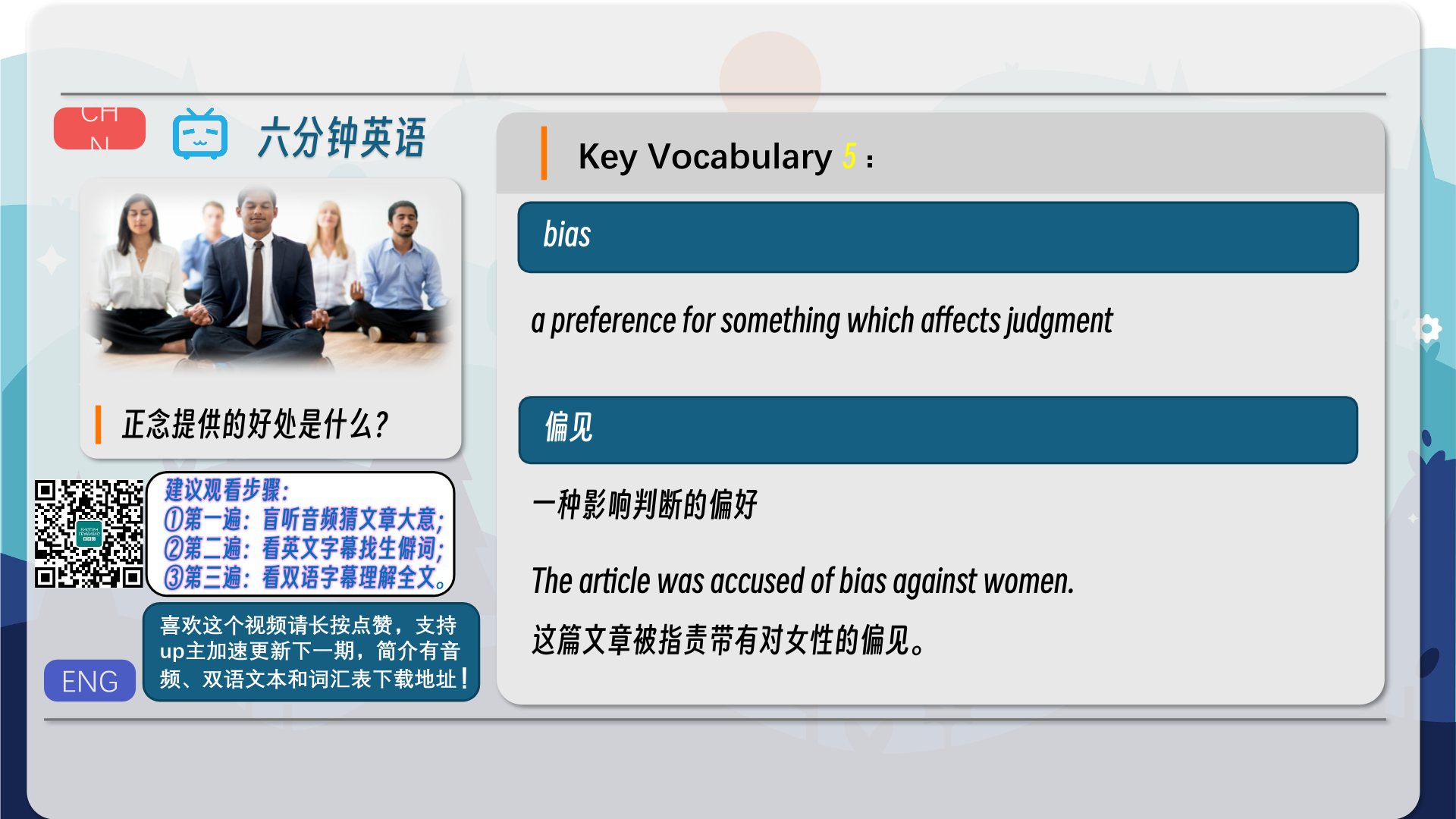
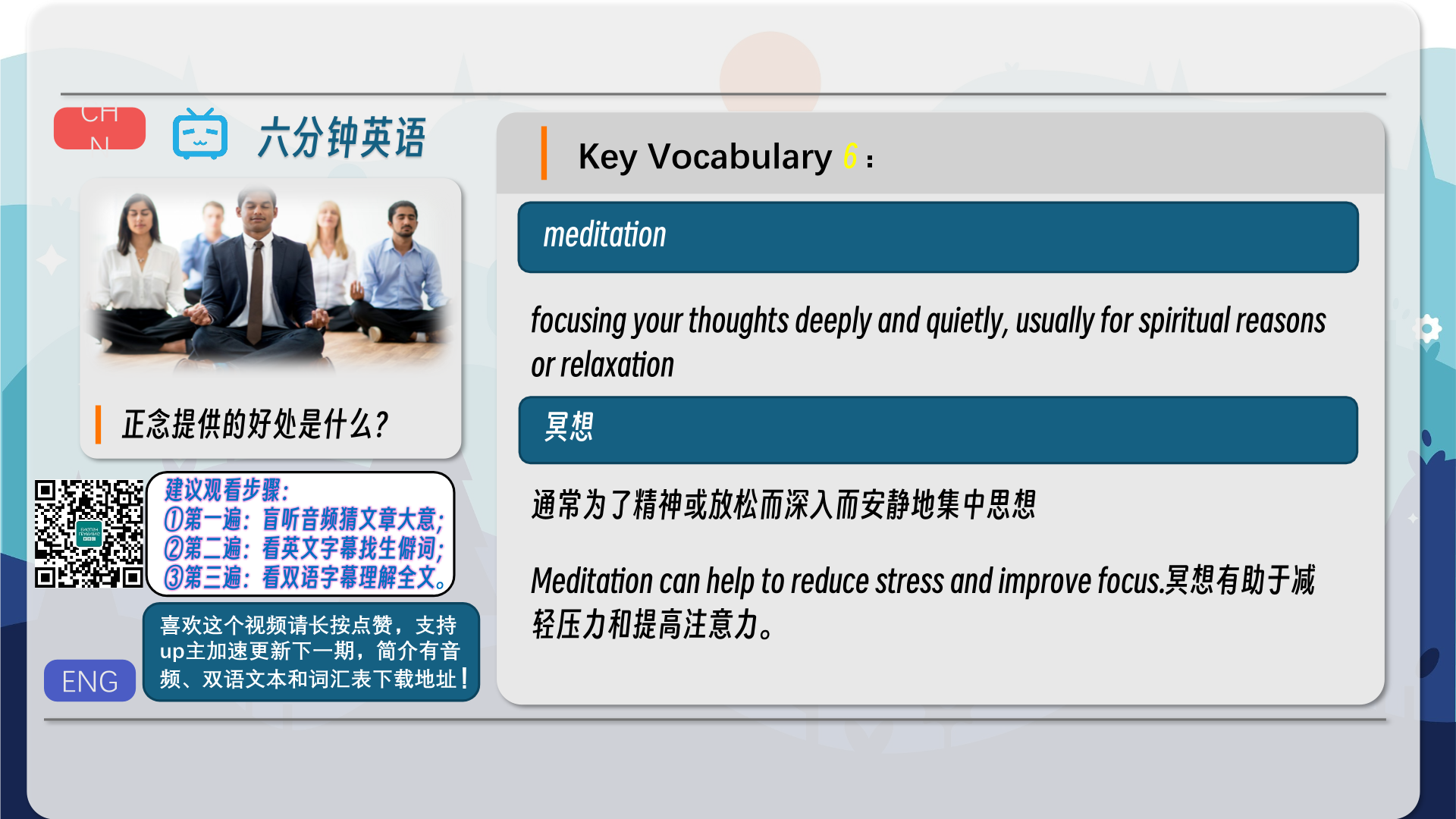
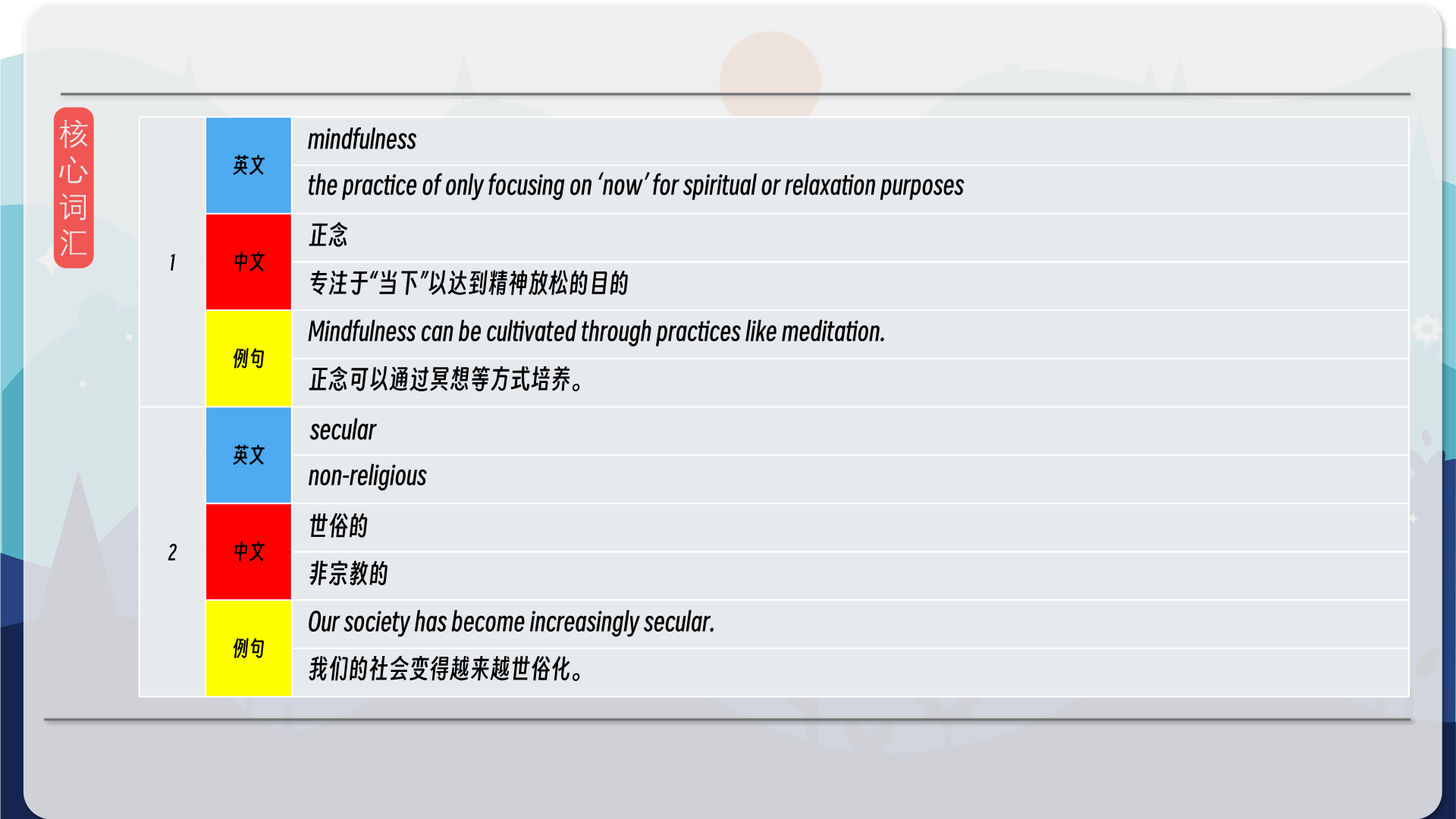
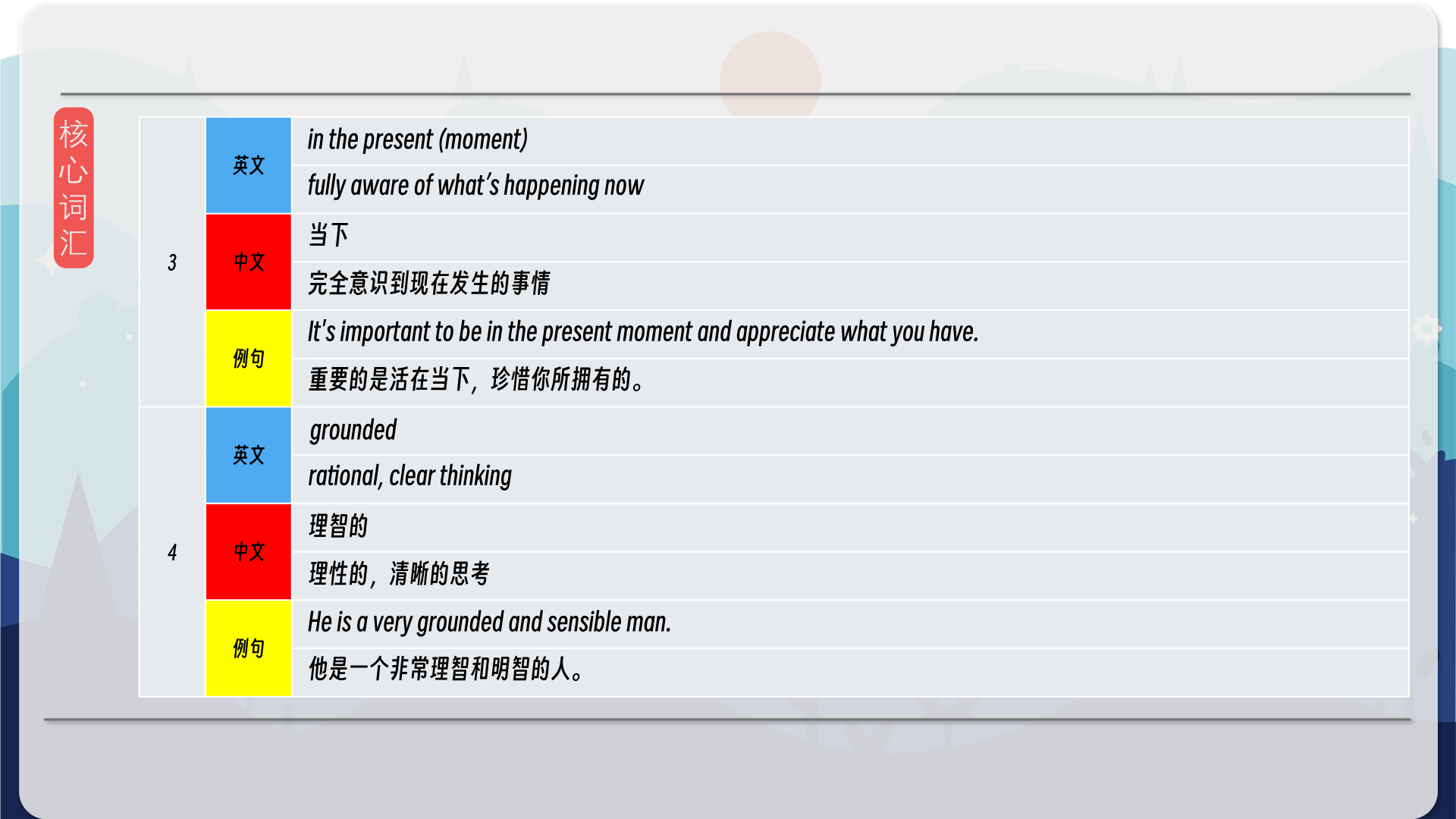
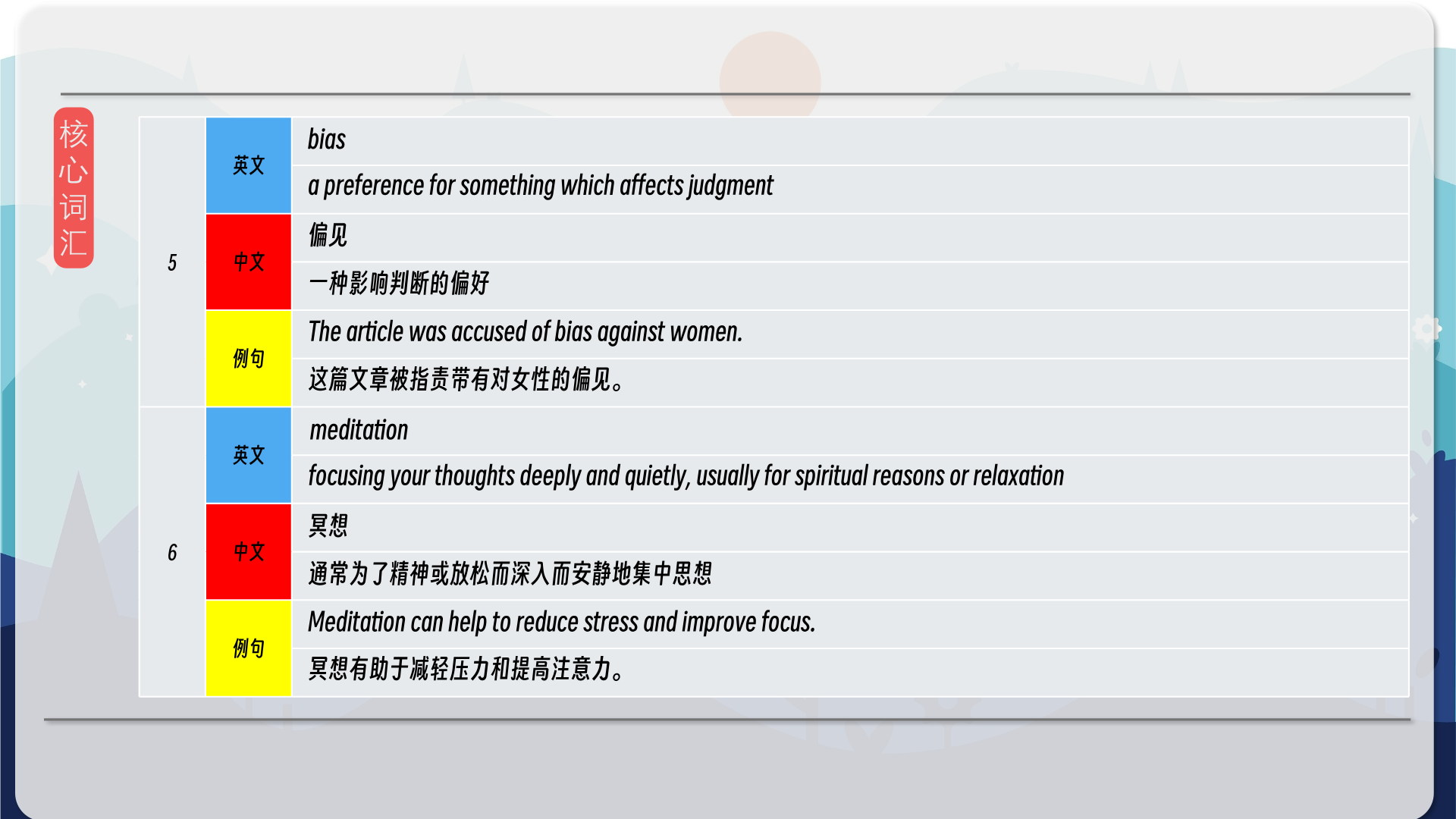
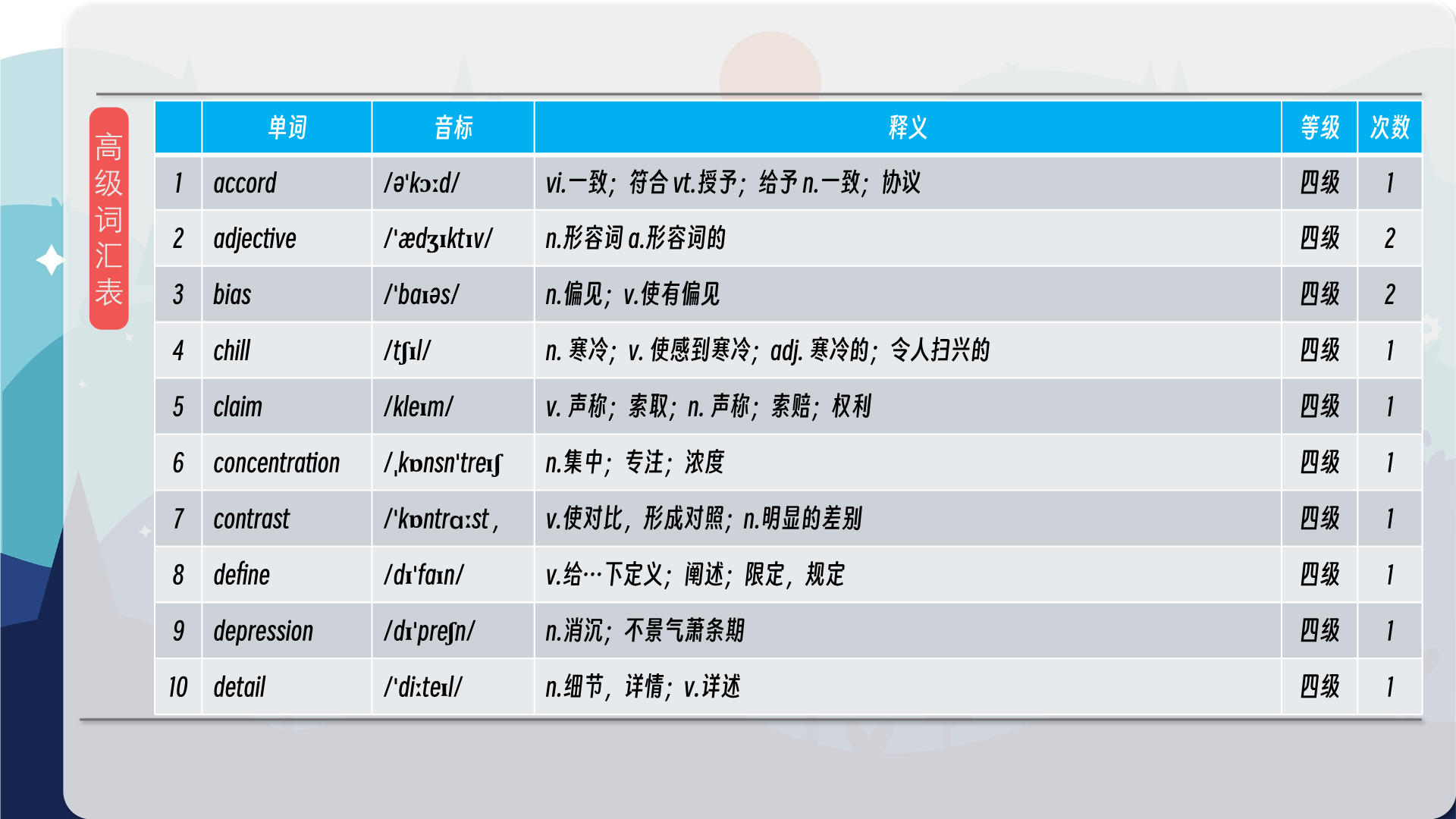
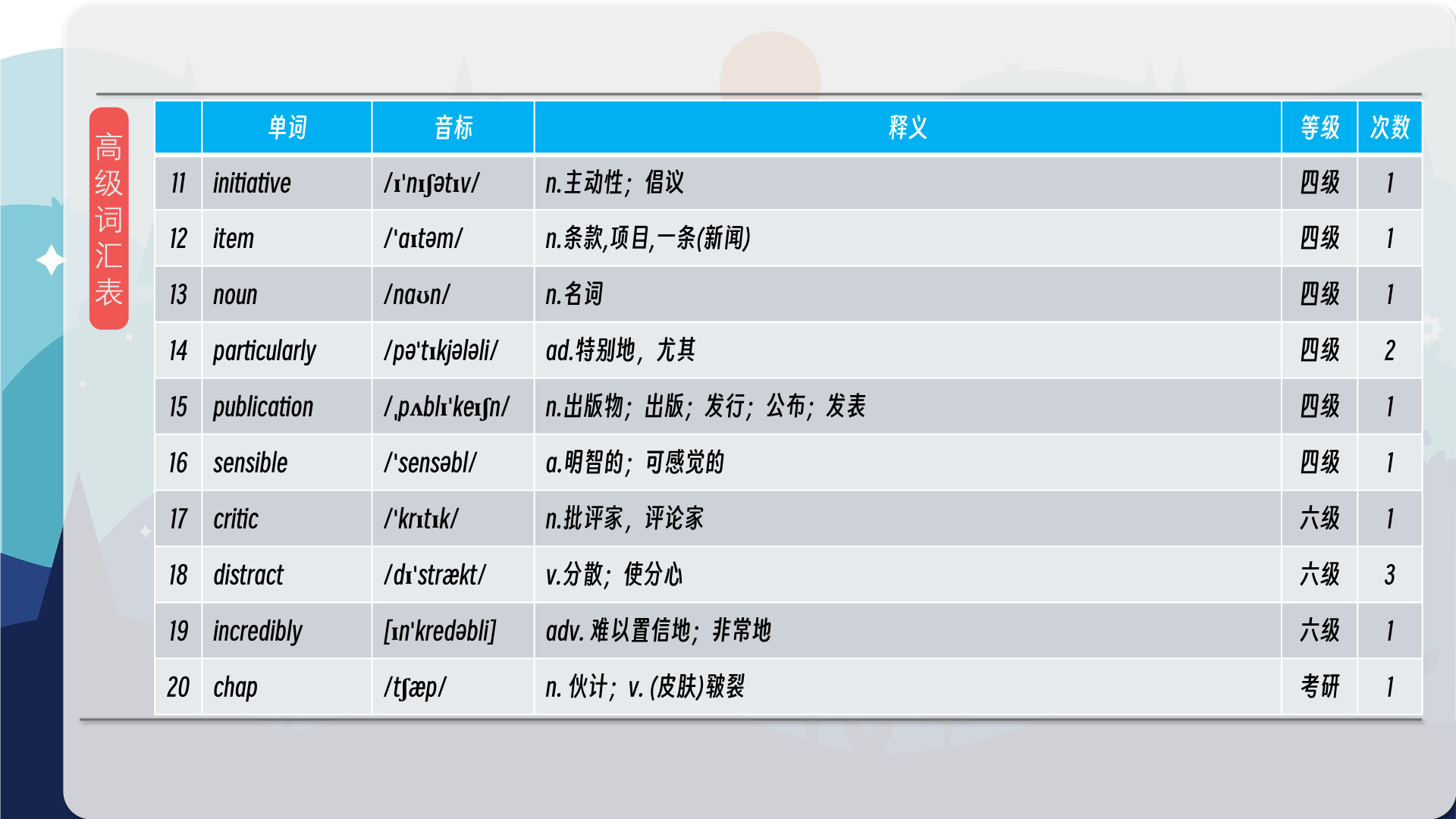
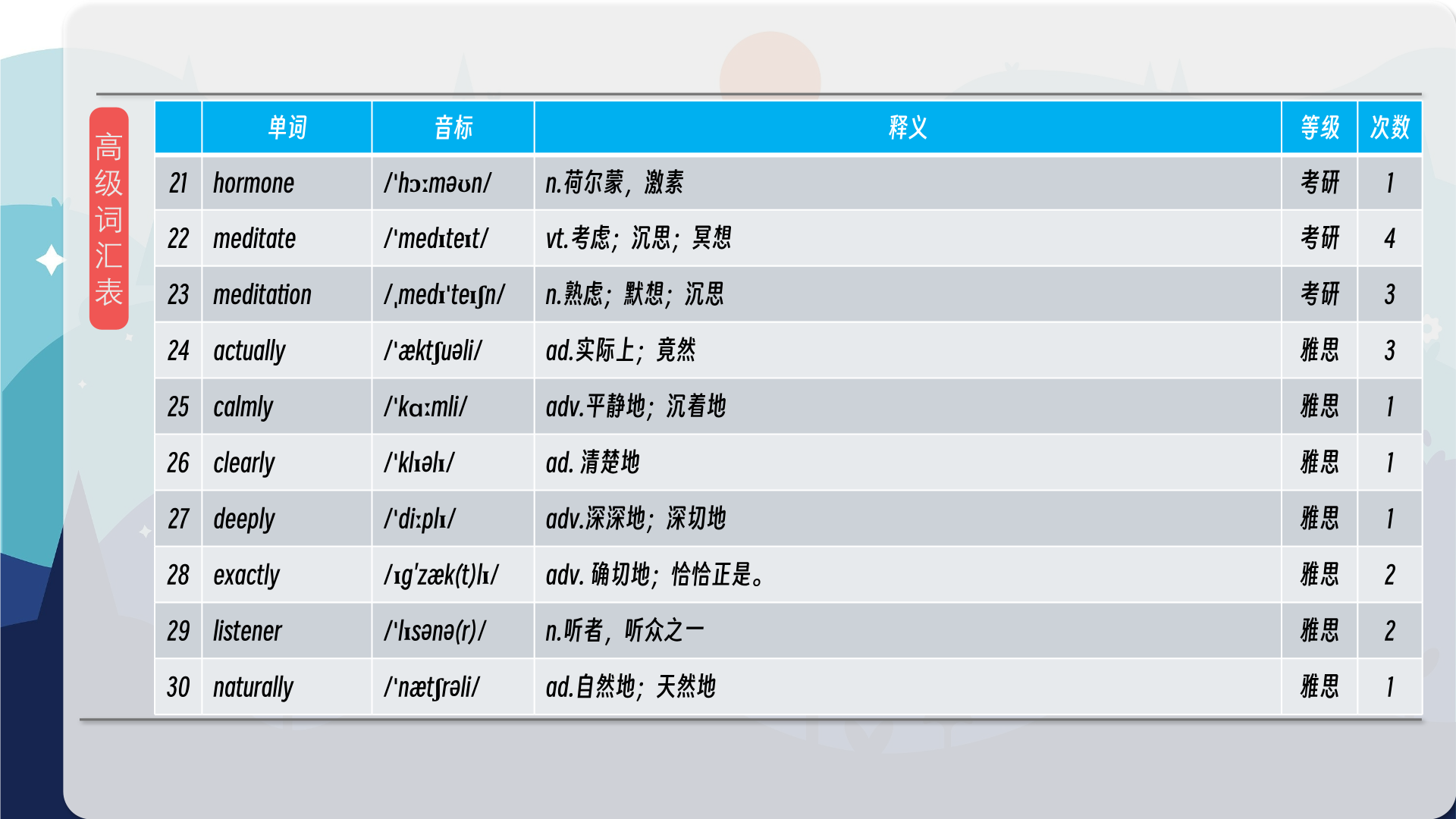
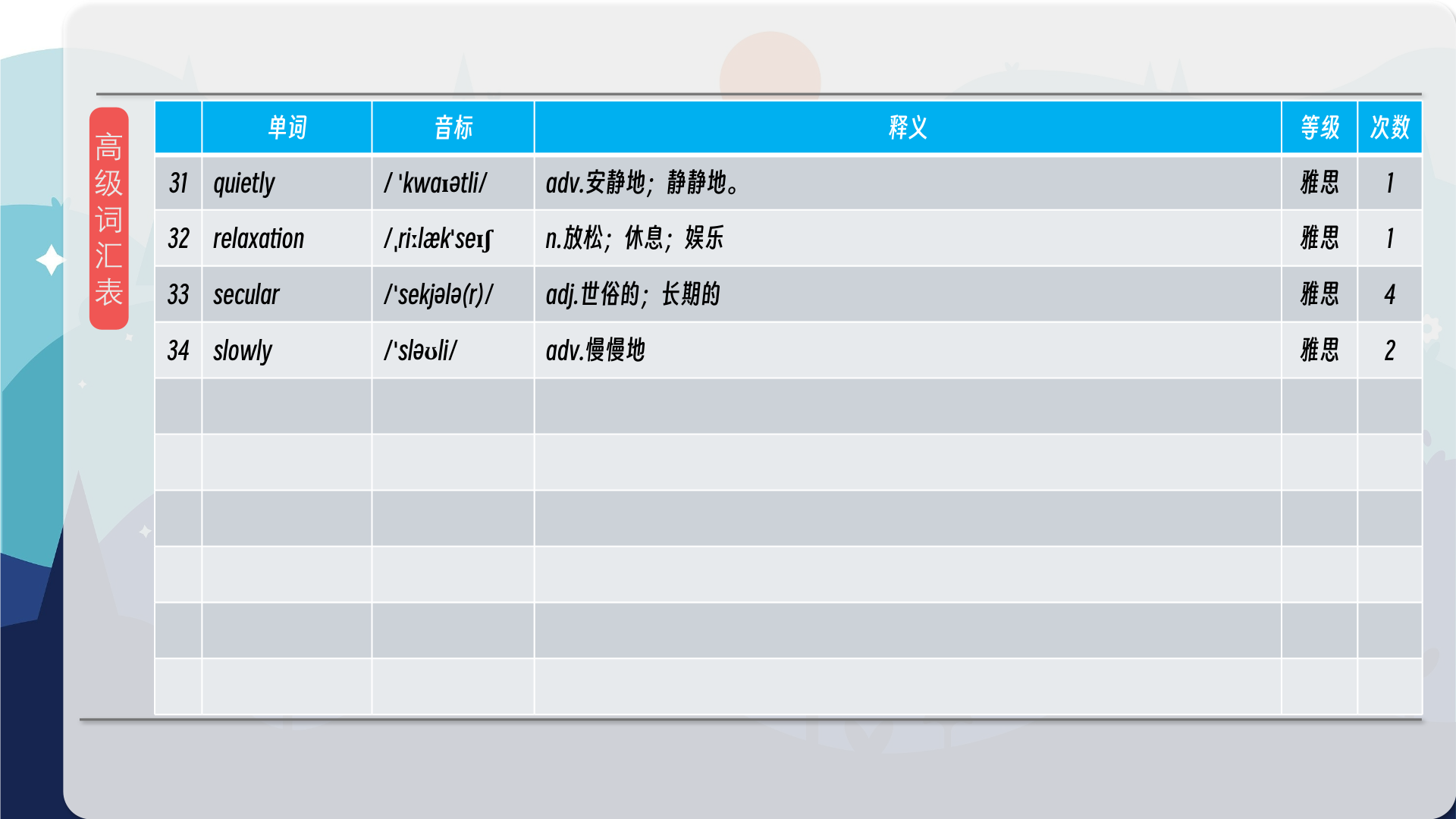

【核心词汇】
mindfulness
the practice of only focusing on ‘now’ for spiritual or relaxation purposes
正念
专注于“当下”以达到精神放松的目的
Mindfulness can be cultivated through practices like meditation.
正念可以通过冥想等方式培养。
secular
non-religious
世俗的
非宗教的
Our society has become increasingly secular.
我们的社会变得越来越世俗化。
in the present (moment)
fully aware of what’s happening now
当下
完全意识到现在发生的事情
It’s important to be in the present moment and appreciate what you have.
重要的是活在当下,珍惜你所拥有的。
grounded
rational, clear thinking
理智的
理性的,清晰的思考
He is a very grounded and sensible man.
他是一个非常理智和明智的人。
bias
a preference for something which affects judgment
偏见
一种影响判断的偏好
The article was accused of bias against women.
这篇文章被指责带有对女性的偏见。
meditation
focusing your thoughts deeply and quietly, usually for spiritual reasons or relaxation
冥想
通常为了精神或放松而深入而安静地集中思想
Meditation can help to reduce stress and improve focus.
冥想有助于减轻压力和提高注意力。
在公众号里输入6位数字,获取【对话音频、英文文本、中文翻译、核心词汇和高级词汇表】电子档,6位数字【暗号】在文章的最后一张图片,如【220728】,表示22年7月28日这一期。公众号没有的文章说明还没有制作相关资料。年度合集在B站【六分钟英语】工房获取,每年共计300+文档,感谢支持!